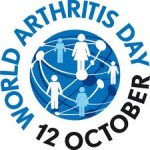
Fibromyalgia
The Simple Tasks Campaign – take action!

Earlier this month, the Simple Tasks Campaign launched its efforts to raise awareness about the value of rheumatology services.
It’s come about because about 1 million people in the UK have rheumatology conditions but many key decision makers do not understand the scale and severity of the conditions, and do not have enough information about what rheumatology services can offer patients. Continue reading
World Arthritis Day: Saturday 12th October
 Tomorrow – the 12th October – is World Arthritis Day and it’s not too late to get involved.
Tomorrow – the 12th October – is World Arthritis Day and it’s not too late to get involved.
This year’s topic is healthy ageing for people with rheumatic and musculoskeletal diseases, and events are happening all over the world.
Vision 2043, a new international competition, invites people to submit creative ideas, innovations or grand plans that could help transform the lives of people with rheumatic and musculoskeletal diseases and make the world more inclusive.
To find out more on the competition and for a list of what’s going on where, visit www.worldarthritisday.org.
Under the spotlight: reflexology
Used to heal since ancient Egyptian times, we look at how reflexology may help people with arthritis
Reflexology is a complementary therapy that hinges on the belief that there are reflex areas in the feet and hands that correspond to the organs and glands of the body. Stimulating these areas correctly can create a positive effect in the corresponding part of the body.
Evidence exists that reflexology has been practised since ancient Egyptian times. Today it is relatively common – and can be used to treat arthritis according to the British Reflexology Association. Continue reading
Molecule from centipede venom may fight chronic pain
A molecule in centipede venom could form the basis of a new drug that fights pain as effectively as morphine, says a paper published in the Proceedings of the National Academy of Sciences.
Australian and Chinese researchers studied the venom of the Chinese red-headed centipede in an effort to bring hope to millions of people whose lives are blighted by chronic pain. Continue reading
Brain marker can predict chronic pain
People who have a particular abnormality in their brain structure are more likely to develop chronic pain after a lower back injury, says research published in Pain.
US scientists carried out MRI scans on 46 people who had developed a lower back injury in the past four weeks but had not experienced any back pain in the previous year. A year later MRI scans were redone. By then, half of the patients had improvements in their back pain (regardless of any treatment they had). Continue reading
